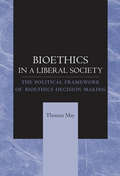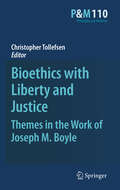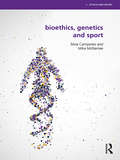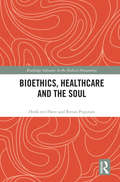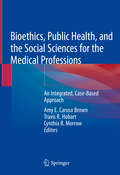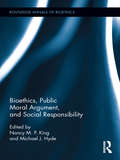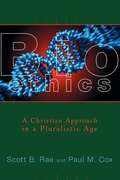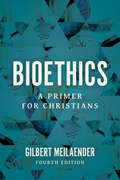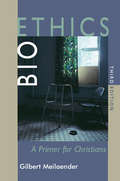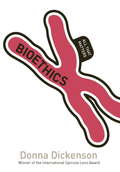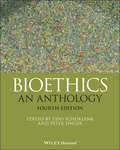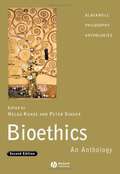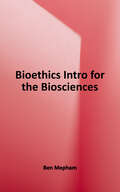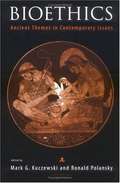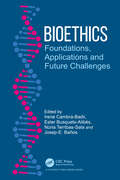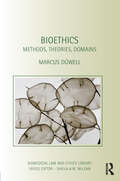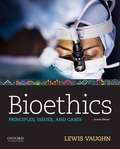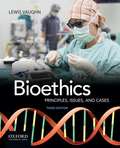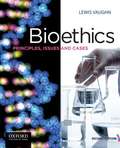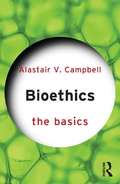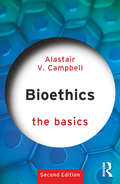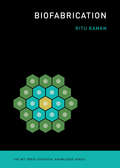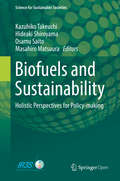- Table View
- List View
Bioethics in a Liberal Society: The Political Framework of Bioethics Decision Making
by Thomas MayIssues concerning patients' rights are at the center of bioethics, but the political basis for these rights has rarely been examined. In Bioethics in a Liberal Society: The Political Framework of Bioethics Decision Making, Thomas May offers a compelling analysis of how the political context of liberal constitutional democracy shapes the rights and obligations of both patients and health care professionals. May focuses on how a key feature of liberal society—namely, an individual's right to make independent decisions—has an impact on the most important relational facets of health care, such as patients' autonomy and professionals' rights of conscience.Although a liberal political framework protects individual judgments, May asserts that this right is based on the assumption of an individual's competency to make sound decisions. May uses case studies to examine society's approach to medical decision making when, for reasons ranging from age to severe mental disorder, a person lacks sufficient competency to make independent and fully informed choices. To protect the autonomy of these vulnerable patients, May emphasizes the need for health care ethics committees and ethics consultants to help guide the decision-making process in clinical settings. Bioethics in a Liberal Society is essential reading for all those interested in understanding how bioethics is practiced within our society.
Bioethics with Liberty and Justice: Themes in the Work of Joseph M. Boyle (Philosophy and Medicine #110)
by Christopher TollefsenJoseph M. Boyle Jr. has been a major contributor to the development of Catholic bioethics over the past thirty five years. Boyle's contribution has had an impact on philosophers, theologians, and medical practitioners, and his work has in many ways come to be synonymous with analytically rigorous philosophical bioethics done in the Catholic intellectual tradition. Four main themes stand out as central to Boyle's contribution: the sanctity of life and bioethics: Boyle has elaborated a view of the ethics of killing at odds with central tenets of the euthanasia mentality, double effect and bioethics: Boyle is among the pre-eminent defenders of a role for double effect in medical decision making and morality, the right to health care: Boyle has moved beyond the rhetoric of social justice to provide a natural law grounding for a political right to health care; and the role of natural law and the natural law tradition in bioethics: Boyle's arguments have been grounded in a particularly fruitful approach to natural law ethics, the so-called New Natural Law theory. The contributors to BIOETHICS WITH LIBERTY AND JUSTICE: THEMES IN THE WORK OF JOSEPH M. BOYLE discuss, criticize, and in many cases extend the Boyle's advances in these areas with rigor and sophistication. It will be of interest to Catholic and philosophical bioethicists alike.
Bioethics, Genetics and Sport (Ethics and Sport)
by Silvia Camporesi Mike McNameeAdvances in genetics and related biotechnologies are having a profound effect on sport, raising important ethical questions about the limits and possibilities of the human body. Drawing on real case studies and grounded in rigorous scientific evidence, this book offers an ethical critique of current practices and explores the intersection of genetics, ethics and sport. Written by two of the world's leading authorities on the ethics of biotechnology in sport, the book addresses the philosophical implications of the latest scientific developments and technological data. Distinguishing fact from popular myth and science fiction, it covers key topics such as the genetic basis of sport performance and the role of genetic testing in talent identification and development. Its ten chapters discuss current debates surrounding issues such as the shifting relationship between genetics, sports medicine and sports science, gene enhancement, gene transfer technology, doping and disability sport. The first book to be published on this important subject in more than a decade, this is fascinating reading for anyone with an interest in the ethics of sport, bioethics or sport performance.
Bioethics, Healthcare and the Soul (Routledge Advances in the Medical Humanities)
by Henk ten Have Renzo PegoraroThis thought-provoking book explores the connections between health, ethics, and soul. It analyzes how and why the soul has been lost from scientific discourses, healthcare practices, and ethical discussions, presenting suggestions for change. Arguing that the dominant scientific worldview has eradicated talk about the soul and presents an objective and technical approach to human life and its vulnerabilities, Ten Have and Pegoraro look to rediscover identity, humanity, and meaning in healthcare and bioethics. Taking a mulitidisciplinary approach, they investigate philosophical, scientific, historical, cultural, social, religious, economic, and environmental perspectives as they journey toward a new, global bioethics, emphasizing the role of the moral imagination. Bioethics, Healthcare and the Soul is an important read for students, researchers, and practitioners interested in bioethics and person-centred healthcare.
Bioethics, Medicine and the Criminal Law
by Suzanne Ost Margaret BrazierThrough socio-legal, theoretical, comparative and historical analysis, case studies and empirical research, this three-volume set offers balanced arguments which help the reader form a reasoned view on the ethical legitimacy of the invocation and use of criminal law to regulate medical practice and bioethical issues. To date, little analysis exists of the criminal process's role in regulating medical practice, its role as an arbiter of bioethics, or its ability to serve as an appropriate forum for judging ethical medical dilemmas. The books analyse how effectively the criminal law can and does operate as a forum for resolving ethical conflict in the contexts of health care, scientific research and biotechnologies. Key questions that are addressed include: how does criminal law regulate controversial bioethical areas? What effect does the use of criminal law have when regulating bioethical conflict? Can the law accommodate moral controversy? And are bioethics and criminal law compatible?
Bioethics, Medicine and the Criminal Law: Walking the Tightrope
by Suzanne Ost Rebecca Bennett Amel AlghraniWho should define what constitutes ethical and lawful medical practice? Judges? Doctors? Scientists? Or someone else entirely? This volume analyses how effectively criminal law operates as a forum for resolving ethical conflict in the delivery of health care. It addresses key questions such as: how does criminal law regulate controversial bioethical areas? What effect, positive or negative, does the use of criminal law have when regulating bioethical conflict? And can the law accommodate moral controversy? By exploring criminal law in theory and in practice and examining the broad field of bioethics as opposed to the narrower terrain of medical ethics, it offers balanced arguments that will help readers form reasoned views on the ethical legitimacy of the invocation and use of criminal law to regulate medical and scientific practice and bioethical issues.
Bioethics, Public Health, and the Social Sciences for the Medical Professions: An Integrated, Case-Based Approach
by Amy E. Caruso Brown Travis R. Hobart Cynthia B. MorrowThis unique textbook utilizes an integrated, case-based approach to explore how the domains of bioethics, public health and the social sciences impact individual patients and populations. It provides a structured framework suitable for both educators (including course directors and others engaged in curricular design) and for medical and health professions students to use in classroom settings across a range of clinical areas and allied health professions and for independent study.The textbook opens with an introduction, describing the intersection of ethics and public health in clinical practice and the six key themes that inform the book's core learning objectives, followed by a guide to using the book. It then presents 22 case studies that address a broad spectrum of patient populations, clinical settings, and disease pathologies. Each pair of cases shares a core concept in bioethics or public health, from community perspectives and end-of-life care to medical mistakes and stigma and marginalization. They engage learners in rigorous clinical and ethical reasoning by prompting readers to make choices based on available information and then providing additional information to challenge assumptions, simulating clinical decision-making. In addition to providing a unique, detailed clinical scenario, each case is presented in a consistent format, which includes learning objectives, questions and responses for self-directed learning, questions and responses for group discussion, references, and suggested further reading. All cases integrate the six themes of patient- and family-centered care; evidence-based practice; structural competency; biases in decision-making; cultural humility and awareness of the culture of medicine; and justice, social responsibility and advocacy. The final section discusses some challenges to evaluating courses and learning encounters that adopt the cases and includes a model framework for learner assessment.
Bioethics, Public Moral Argument, and Social Responsibility (Routledge Annals of Bioethics)
by Nancy M. P. King Michael J. HydeBioethics, Public Moral Argument, and Social Responsibility explores the role of democratically oriented argument in promoting public understanding and discussion of the benefits and burdens of biotechnological progress. The contributors examine moral and policy controversies surrounding biomedical technologies and their place in American society, beginning with an examination of discourse and moral authority in democracy, and addressing a set of issues that include: dignity in health care; the social responsibilities of scientists, journalists, and scholars; and the language of genetics and moral responsibility.
Bioethics: A Christian Approach in a Pluralistic Age
by Scott B. Rae Paul M. CoxThe authors assess various secular approaches to bioethics that are particularly influential today and develop a framework for a Christian approach to assist people in addressing the many pressing issues in the field. Throughout, the authors touch on the numerous debated issues in bioethics though they are primarily concerned to give an account of the central theological notions crucial to an informed Christian perspective on bioethics.
Bioethics: A Primer for Christians
by Gilbert MeilaenderAmid continuing advances in medical research and treatment, Gilbert Meilaender&’s Bioethics has long provided thoughtful guidance on many of society&’s most difficult moral problems—including abortion, assisted reproduction, genetic experimentation, euthanasia, and much more. In this fourth edition, Meilaender updates much of the data referenced in the book and responds directly to recent developments, such as the CRISPR/Cas9 method of gene editing. Christians seeking discernment in this new decade will appreciate Meilaender&’s circumspect writing and his ability to address the nuances of each issue while maintaining strong and clearly stated moral convictions.
Bioethics: A Primer for Christians, Third Edition
by Gilbert MeilaenderIn the face of continuing advances in medical research and treatment, bioethics remains a serious ongoing social concern. For nearly two decades Gilbert Meilaender’s Bioethics has offered discerning Christian guidance on a wide range of pressing issues in medical ethics. Now in its third edition, Meilaender’s Bioethics covers abortion, assisted reproduction, genetic research, suicide and euthanasia, human experimentation — and much more — in language that is theologically informed, straightforward, and clear. This new edition includes updated information throughout and an added discussion of the need to protect Christian conscience in the practice of medicine.
Bioethics: All That Matters
by Donna DickensonIn this book:Donna Dickenson - Winner of the International Spinoza Lens AwardShould we do what ever science lets us do?Bioethics: All That Matters, new developments in biotechnology like genetics, stem cell research and artificial reproduction arouse both our greatest hopes and our greatest fears. Many people invest the new biotechnology with all the aspirations and faith once accorded to religious salvation. But does everyone benefit equally from scientific progress? Commercialised modern biomedicine runs the risk of exploiting vulnerable groups, from Indian 'surrogate' mothers to professional guinea pigs in drug research. Professor Dickenson argues that although we've entered new scientific territory, there's no need to jettison our existing moral sense. By discussing a range of real-life cases, she equips readers to make up their own minds on these important and controversial questions. Good science and good ethics needn't be contradictory.This accessible and concise book will appeal to both students and general readers, giving a fascinating introduction to a wide range of perspectives on Bioethics.All That Matters books:All books in the All That Matters series are written by world experts in their subject field. These experts work to distil a topic and get right to its heart, making the book accessible for both students and general readers. Each compelling book contains new and interesting perspectives and tells stories that matter.The Author:All That Matters - Interesting introductions to important issuesBooks on the following subjects are available from the All That Matters series: Muhammad, God, Water, Political Philosophy, Sustainability, Philosophy, Intelligence, Love, Russian Revolution, War, and Creativity.To find out more visit: www.allthatmattersbooks.com
Bioethics: An Anthology (Blackwell Philosophy Anthologies #27)
by Peter Singer Udo Sch KlenkThe new edition of the classic collection of key readings in bioethics, fully updated to reflect the latest developments and main issues in the field For more than two decades, Bioethics: An Anthology has been widely regarded as the definitive single-volume compendium of seminal readings on both traditional and cutting-edge ethical issues in biology and medicine. Acclaimed for its scope and depth of coverage, this landmark work brings together compelling writings by internationally-renowned bioethicist to help readers develop a thorough understanding of the central ideas, critical issues, and current debate in the field. Now fully revised and updated, the fourth edition contains a wealth of new content on ethical questions and controversies related to the COVID-19 pandemic, advances in CRISPR gene editing technology, physician-assisted death, public health and vaccinations, transgender children, medical aid in dying, the morality of ending the lives of newborns, and much more. Throughout the new edition, carefully selected essays explore a wide range of topics and offer diverse perspectives that underscore the interdisciplinary nature of bioethical study. Edited by two of the field’s most respected scholars, Bioethics: An Anthology: Covers an unparalleled range of thematically-organized topics in a single volume Discusses recent high-profile cases, debates, and ethical issues Features three brand-new sections: Conscientious Objection, Academic Freedom and Research, and Disability Contains new essays on topics such as brain death, life and death decisions for the critically ill, experiments on humans and animals, neuroethics, and the use of drugs to ease the pain of unrequited love Includes a detailed index that allows the reader to easily find terms and topics of interest Bioethics: An Anthology, Fourth Edition remains a must-have resource for all students, lecturers, and researchers studying the ethical implications of the health-related life sciences, and an invaluable reference for doctors, nurses, and other professionals working in health care and the biomedical sciences.
Bioethics: An Anthology (Second Edition)
by Peter Singer Helga KuhseThe expanded and revised edition of Bioethics: An Anthology is a definitive one-volume collection of key primary texts for the study of bioethics. Brings together writings on a broad range of ethical issues relating such matters as reproduction, genetics, life and death, and animal experimentation. Now includes introductions to each of the sections. Features new coverage of the latest debates on hot topics such as genetic screening, the use of embryonic human stem cells, and resource allocation between patients. The selections are independent of any particular approach to bioethics. Can be used as a source book to complement A Companion to Bioethics (1999).
Bioethics: An Introduction for the Biosciences
by Ben MephamBioethical issues remain front-page news, with debate continuing to rage over issues including genetic modification, animal cloning, and 'designer babies'. With public opinion often driven by media speculation, how can we ensure that informed decisions regarding key bioethical issues are made in a reasoned, objective way? Bioethics: An Introduction for the Biosciences offers a balanced, objective introduction to the field of bioethics, ideal for any biosciences student who is new to the subject. With a focus on developing the students' power of reasoning and judgement, the book presents different perspectives to common themes in an impartial way, fostering debate and discussion. The opening section, 'The Ethical Groundwork', introduces students to the nature of bioethics and ethical theory. The book goes on to lead students through a broad range of bioethical issues relating to people, animals, and food, before concluding with an overview of bioethics in practice. The current generation of students will become the next generation of decision makers. Bioethics: An Introduction for the Biosciences is the perfect introduction to a field with which every biosciences student should be familiar. Online Resource Centre The Online Resource Centre features: For registered adopters of the book: - Figures from the book in electronic format, ready to download For students: - A web link library and hyperlinked reference list, giving ready access to additional information sources; - Topical updates: extensive summaries of the latest developments in those topics covered in the book, ensuring that the reader can remain up-to-date at all times.
Bioethics: Ancient Themes in Contemporary Issues
by Mark G. Kuczewski Ronald M. PolanskyThis collection of essays explores themes from ancient Greek philosophy and medicine and their implications for contemporary medicine and bio-medical ethics. Thus the work examines the relationship of two of the most popular areas in the current revival of ethics, namely, classical ethics and biomedical ethics--areas that have seldom been brought together in any serious or sustained way. The essays in this volume are written by established classical scholars and bioethicists.
Bioethics: Foundations, Applications and Future Challenges
by Irene Cambra-Badii Ester Busquets-Alibés Terribas-Sala Núria Josep-E. BañosThe aim of this book is to introduce and discuss bioethics in a three-synergistic way: from the foundations to the current debates in relation to healthcare and social bioethics, and thereafter the possible future challenges. In this sense, the target audience can be from diverse disciplines: life and medical sciences, law, philosophy, psychology, and education. The book will be useful to high school students, in their first contacts with bioethics, college students, teachers and researchers, and the general public interested in these controversial debates of the past, present and future of bioethics.
Bioethics: Methods, Theories, Domains (Biomedical Law and Ethics Library)
by Marcus DüwellThis book is a philosophically-oriented introduction to bioethics. It offers the reader an overview of key debates in bioethics relevant to various areas including; organ retrieval, stem cell research, justice in healthcare and issues in environmental ethics, including issues surrounding food and agriculture. The book also seeks to go beyond simply describing the issues in order to provide the reader with the methodological and theoretical tools for a more comprehensive understanding of current bioethical debates. The aim of the book is to present bioethics as an interdisciplinary field, to explore its close relation to other disciplines (such as law, life sciences, theology and philosophy), and to discuss the conditions under which bioethics can serve as an academically legitimate discipline that is at the same time relevant to society. As a systematic and methodologically rigorous overview, Bioethics: Methods, Theories and Principles will be of particular interest to academics and students in the disciplines of Law, Medicine, Ethics and Philosophy. 'This is a book that embraces neither a single ethical theory nor a pragmatic melange of just-so-principles. It is a thoughtful and engaging analysis of diverse theoretical foundations in Bioethics. It is also an enormous step towards conceptual and philosophical clarity in this fascinating area.' - Professor Christian Illies, Chair for Practical Philosophy at the Otto-Friedrich University Bamberg, Germany
Bioethics: Principles, Issues, And Cases
by Lewis VaughnThis book explores the philosophical, medical, social, and legal aspects of key bioethical issues. Opening with a thorough introduction to ethics, bioethics, and moral reasoning, it then covers influential moral theories and the criteria for evaluating them. Integrating eighty-seven readings--ten of them new to this edition--substantive introductions to each issue, numerous classic bioethical cases, and abundant pedagogical tools, this text addresses the most provocative and controversial topics in bioethics.
Bioethics: Principles, Issues, And Cases, Third Edition
by Lewis VaughnBioethics: Principles, Issues, and Cases, Third Edition, explores the philosophical, medical, social, and legal aspects of key bioethical issues. Opening with a thorough introduction to ethics, bioethics, and moral reasoning, it then covers influential moral theories and the criteria forevaluating them. Integrating eighty-nine readings - twelve of them new to this edition - numerous classic bioethical cases, and abundant pedagogical tools, this text addresses the most provocative and controversial topics in bioethics. PEDAGOGICAL FEATURES:* "Classic Case Files" describe landmark cases that shaped the debate, while news-making "Cases for Evaluation" encourage students to form their own opinions* Various text boxes: "In Depth" boxes contain additional material, illustrations, or analyses, much of it "ripped from the headlines"; "Fact File" boxes provide statistics on the social, medical, and scientific facets of a chapter's topic; and "Legal Brief" boxes summarize important court rulingsand the status of major legislation* "Key Terms" are boldfaced and boxed off within the text and then defined in a glossary at the back of the book* "Applying Major Theories" sections at the end of each chapter help students relate theories to the issues
Bioethics: Principles, Issues, and Cases, Second Edition
by Lewis VaughnBioethics: Principles, Issues, and Cases, Second Edition, explores the philosophical, medical, social, and legal aspects of key bioethical issues. Opening with a thorough introduction to ethics, bioethics, and moral reasoning, it then covers influential moral theories and the criteria for evaluating them. Integrating eighty-five readings - thirteen of them new to this edition - numerous cases, and abundant pedagogical tools, the book addresses the most provocative and controversial topics in bioethics. Updated throughout, the second edition incorporates new information on justice, health care, and health insurance reform along with more coverage of issues related to race and culture and of the moral challenges facing nurses and other health care professionals. It also offers additional step-by-step guidance on how to identify and evaluate moral arguments in real-world contexts, with accompanying exercises and answers in an appendix.
Bioethics: The Basics
by Alastair V. CampbellBioethics: The Basics is an introduction to the foundational principles, theories and issues in the study of medical and biological ethics. Readers are introduced to bioethics from the ground up before being invited to consider some of the most controversial but important questions facing us today. Topics addressed include: The range of moral theories underpinning bioethics Arguments for the rights and wrongs of abortion, euthanasia and animal research Healthcare ethics including the nature of the practitioner-patient relationship Public policy ethics and the implications of global and public health Concise, readable and authoritative, this is the ideal primer for anyone interested in the study of bioethics.
Bioethics: The Basics (The Basics)
by Alastair V. CampbellBioethics: The Basics is an introduction to the foundational principles, theories and issues in the study of medical and biological ethics. Readers are introduced to bioethics from the ground up before being invited to consider some of the most controversial but important questions facing us today. Topics addressed include: the range of moral theories underpinning bioethics arguments for the rights and wrongs of abortion, euthanasia and animal research health care ethics including the nature of the practitioner-patient relationship public policy ethics and the implications of global and public health ‘3 parents’, enhancement, incidental findings and nudge approaches in health care. This thoroughly revised second edition provides a concise, readable and authoritative introduction for anyone interested in the study of bioethics.
Biofabrication (The MIT Press Essential Knowledge series)
by Ritu RamanHow engineered materials and machines powered by living biological cells can tackle technological challenges in medicine, agriculture, and global security.You are a biological machine whose movement is powered by skeletal muscle, just as a car is a machine whose movement is powered by an engine. If you can be built from the bottom up with biological materials, other machines can be as well. This is the conceptual starting point for biofabrication, the act of building with living cells--building with biology in the same way we build with synthetic materials. In this volume in the MIT Press Essential Knowledge series, Ritu Raman offers an accessible introduction to biofabrication, arguing that it can address some of our greatest technological challenges. After presenting the background information needed to understand the emergence and evolution of biofabrication and describing the fundamental technology that enables building with biology, Raman takes deep dives into four biofabrication applications that have the potential to affect our daily lives: tissue engineering, organs-on-a-chip, lab-grown meat and leather, and biohybrid machines. Organs-on-a-chip (devices composed of miniature model tissues), for example, could be used to test new medicine and therapies, and lab-grown meat could alleviate environmental damage done by animal farming. She shows that biological materials have abilities synthetic materials do not, including the ability to adapt dynamically to their environments. Exploring the principles of biofabrication, Raman tells us, should help us appreciate the beauty, adaptiveness, and persistence of the biological machinery that drives our bodies and our world.
Biofuels and Sustainability: Holistic Perspectives for Policy-making (Science for Sustainable Societies)
by Hideaki Shiroyama Osamu Saito Kazuhiko Takeuchi Masahiro MatsuuraThis open access book presents a comprehensive analysis of biofuel use strategies from an interdisciplinary perspective using sustainability science. This interdisciplinary perspective (social science-natural science) means that the strategies and policy options proposed will have significant impacts on the economy and society alike. Biofuels are expected to contribute to reducing greenhouse gas emissions, revitalizing economies in agricultural communities and alleviating poverty. However, despite these anticipated benefits, international organizations such as the FAO, OECD and UN have published reports expressing concerns that biofuel promotion may lead to deforestation, water pollution and water shortages. The impacts of biofuel use are extensive, cross-sectoral and complex, and as such, comprehensive analyses are required in order to assess the extent to which biofuels can contribute to sustainable societies. Applying interdisciplinary sustainability science concepts and methodologies, the book helps to enhance the establishment of a sustainable society as well as the development of appropriate responses to a global need for urgent action on current issues related to biofuels.
